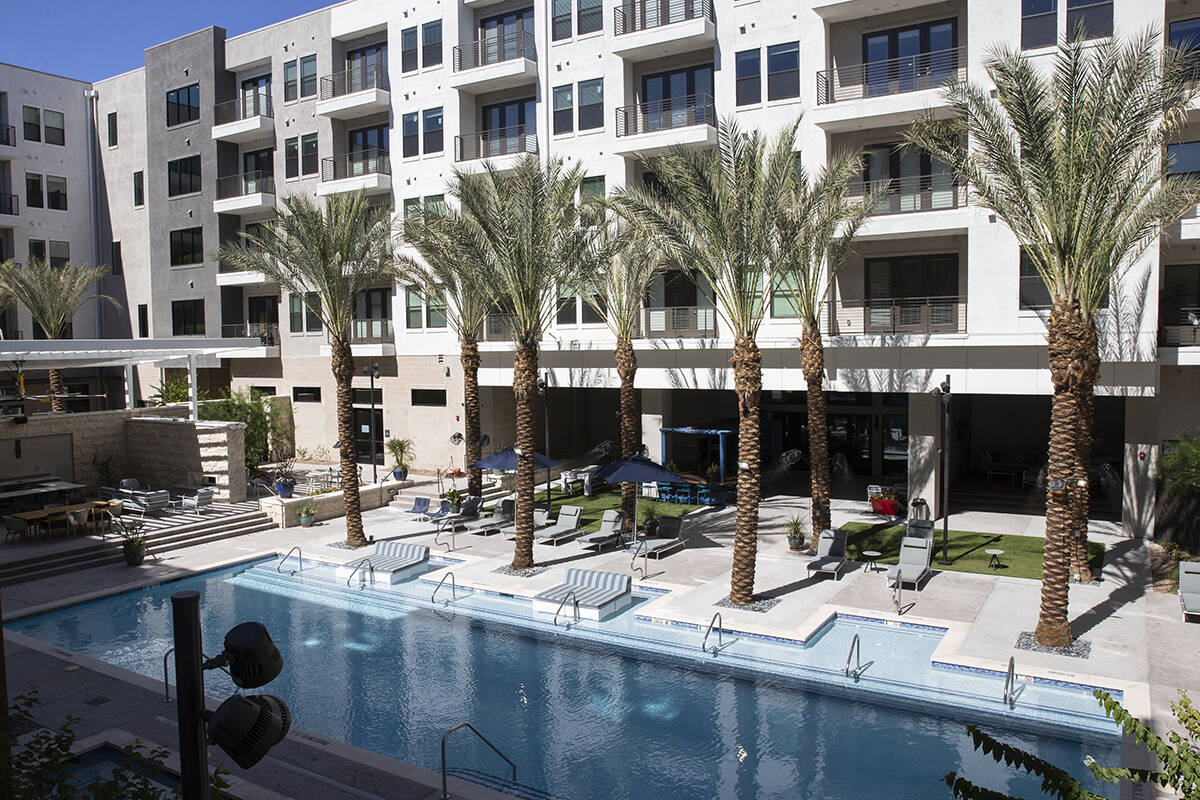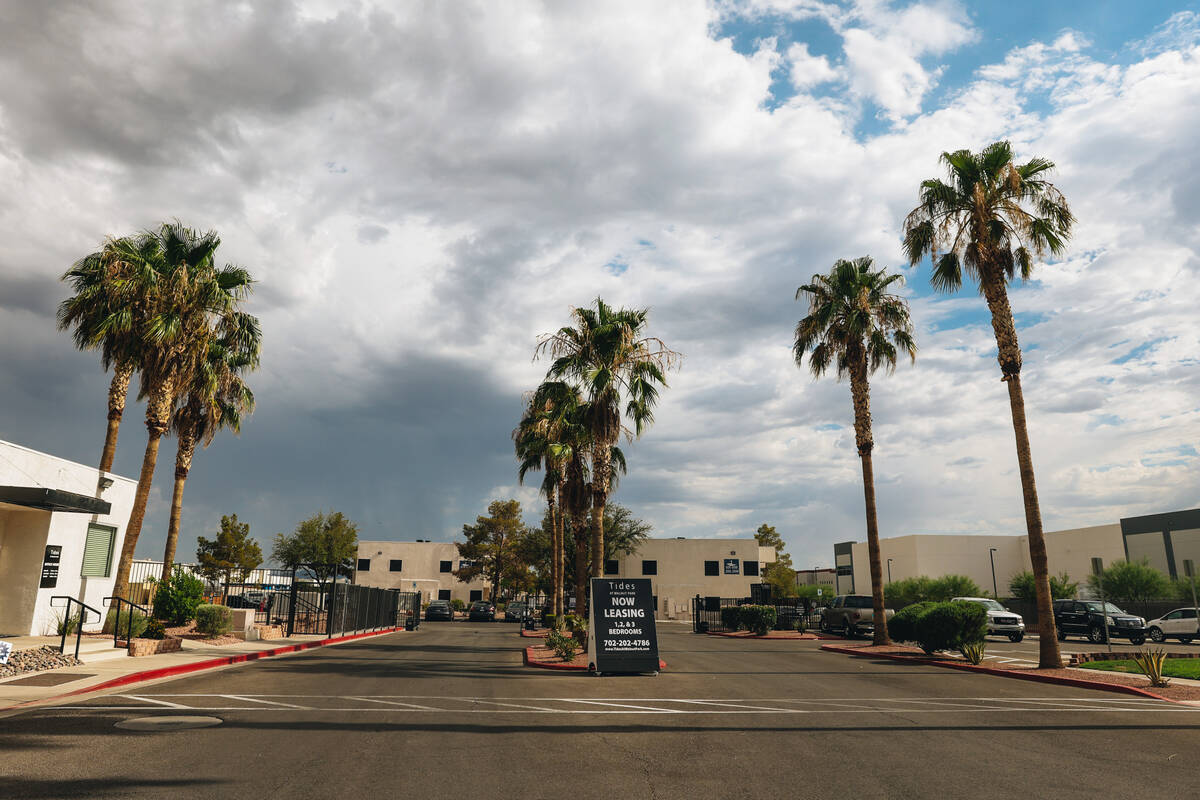What’s happening with Las Vegas’ apartment market?
Pandemic-era, variable rate financing is pushing some Las Vegas Valley apartment complex owners into tough financial situations, according to a several area commercial brokers.
This is a nationwide issue that is hitting Sun Belt cities particularly hard, said Jeffrey Swinger, an executive vice president for multifamily investment sales with Colliers International in Las Vegas.
“What this really boils down to is interest rates and COVID,” he said. ”Particularly starting in 2021, a lot of the lenders (within the multifamily market) because interest rates were zero, were able to offer these short-term floating rate loans, and they were typically three years. If you fast forward to today, a lot of these loans are coming due at today’s interest rates and it’s crushing them.”
Commercial brokers pointed to the Secured Overnight Financing Rate, a measure of the cost of borrowing cash overnight collateralized by Treasury securities, which was at zero percent for much of the second half of 2021 and first half of 2022. Now, it sits at above 5 percent.
What remains uncertain is the number of Las Vegas Valley apartment complexes currently in this particular financial situation and what will happen to them. The Las Vegas Review-Journal spoke to more than half a dozen multifamily brokers and all said the local industry is currently holding its breath to see what plays out in the coming months.
Deals are down
Swinger said some of the projects could be refinanced, however he could see scenarios where lenders take the properties back from investors at a loss and either manage them or try to sell them.
“But a lot of these lenders don’t want to take the loss,” he said. “They don’t want to foreclose, so they’re kind of doing the extend and pretend thing.”
Colliers International data shows there are approximately 232,751 multifamily units in the Las Vegas Valley, and in 2021 at the bottom of the interest rate cycle, there were 80 multifamily transactions of buildings with 100 or more units for a sales volume of $4.8 billion. That number dropped to 51 in 2022, six in 2023 and five so far this year for $198 million. Multiple brokers said many of the deals done from 2021-22 could be under financial stress now.
The Real Deal recently reported that Tides Equities — who according to its website, have 23 projects in the Las Vegas Valley — just had its 176-unit Tides at Walnut Park complex foreclosed on. Multiple commercial brokers who spoke to the Las Vegas Review-Journal on condition of anonymity said they believe a large chunk of Tides Equities properties could have possibly been financed during this zero-interest period.
Tides Equities did not return a request for comment from the Las Vegas Review-Journal.
What could happen next
Kyle Nagy, founder and president of CommCap Advisors, a commercial mortgage banking firm, said refinancing or extensions on some of these multifamily loans will play out on a case-by-case basis, and the local industry is very much taking a “wait-and-see” approach to the issue.
“Each case of disarray is assessed and addressed differently. Refinancing can be a viable solution if the property’s cash flow supports a new loan with more favorable terms. Since construction and bridge loan interest rates are typically higher than permanent debt, there may be room for a refinance rate reduction,” he said. “When necessary, a foreclosure or forced short sale is a solution, but can significantly impact the market by setting a new market comparable.”
Jared Glover, a senior director of investment sales for Las Vegas and Reno with Berkadia who focuses on multifamily properties, said it’s difficult to give a ballpark number as to how many projects are currently having financial difficulties, but he has seen positive signs from lenders about trying to make the loans work.
“From what we have seen so far from the lenders is they are willing to work on loan modifications with the owners,” he said. “And so they are trying to work the sponsors right now until we get to a more normalized interest rate market.”
The Federal Reserve has indicated its desire to cut the federal funds rate, which would be the first cut since rates bottomed out in March 2022. But many industry players said the future is highly uncertain economically speaking, and many forecasters have already been burned in the past thinking rate cuts are on the horizon.
Owen Sherwood, who works in the commercial title industry for Fidelity National Title said there are some “splashy” transactions that are poised to close in the third quarter which could give the local market a boost, but agreed with the assessment that Las Vegas Valley multifamily stakeholders are watching intently for signs of movement.
“Questions remain about whether investors who purchased in 2021 and 2022 can wait out the market and realize appreciation on properties they purchased just a few years ago. Ultimately the market will tell us.”
Contact Patrick Blennerhassett at pblennerhassett@reviewjournal.com.


























